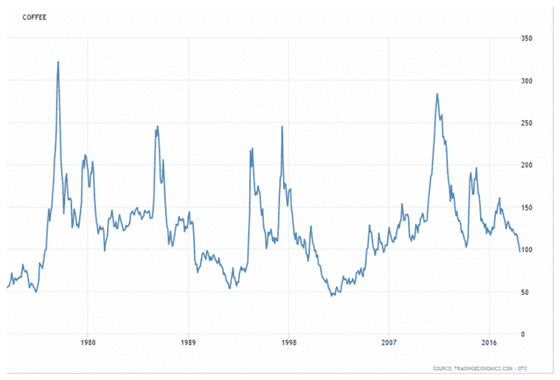What follows below is a well though out discussion about the coffee futures or commodity market, and how we as a coffee industry can response to assist the industry.
Thanks to Cafe Imports for allowing us to re-post, it has been posted in its entirety:

Hello, friends and coffee people. Hello, friends and coffee people.
In recent weeks, many of our customers, partners at origin, and others in the speciality-coffee sphere have expressed concern about the recent dip of the international coffee commodities market, or C Market, to a level below $1 USD per pound green. We share those concerns, and we understand that speciality-coffee professionals everywhere are looking for a solution, feeling frustrated by the volatility of the industry in which we work.
We also recognise that there is a lot of confusion about the implications of the C Market price, and about the way that coffee is traded in different markets, so we thought we’d reach out to try to explain what we know and express how we feel.
The C Market or coffee commodity market is determined by an international commodities trading forecast and is monitored and released by an institution called ICE, or Intercontinental Exchange. The market rate fluctuates constantly during trading hours, though on relatively normal days it might go up or down a few cents. There is always a possibility of a large sudden shift, but generally, it tracks more gradually in one direction or another over a longer period.
The level is dictated by factors like weather patterns, cultural and political events, and supply and demand: Anything that affects the presumed purchasing capacity for a particular commodity can cause a change in the market level.
One primary thing to understand about the C Market is that the coffees traded on it are commercial grade and are bought and sold as futures. This means that “paper coffee,” or contracted coffee, will change hands before actual physical coffee is produced. Futures contracts are written with specific conditions in mind, related to things like “grade” (how many defects are present) as well as processing method, country of origin, etc. Many of the coffee futures on the market are traded on paper alone, meaning it’s the contracts themselves that have the commodity value to the buyer and seller, not the coffee itself. There are, of course, lots of coffee roasters and businesses who buy futures as a means of taking delivery of tangible coffee beans, too, and it’s an efficient way for large, very large, and enormous multinational corporations to manage their stocks of reliable, replaceable, and inexpensive commercial coffees.
Another thing to understand about the C Market is that the price listed is not the price that a farmer receives. When we say, “The market is at $1 USD,” that price includes other costs beyond the farm-gate price: It includes the cost of milling services, freight and factors (shipping and storage), export expenses such as tariffs and documentation, etc. Farmers who sell commercial-grade coffee are making less–sometimes considerably less-than the C per pound, though that amount will vary based on location, farm size and resources, volume, etc.
As businesses operating within a global coffee industry, we are all affected by the fluctuations of the market, and to deny its influence simply because we are “speciality” would be somewhat naïve: We do need to use the C level as a guide in pricing our coffee, though typically we use it as a below-base price and build contracts accordingly. We also hold a position in the futures market in order to hedge our finances as a protection for both us and our partners-roasters, exporters, and farmers alike.
While it is extremely difficult to influence such a massive international trading system as a minuscule segment of the industry, to some extent we are able to shift the needle slightly in one direction or another by acting as independently from the market as we can. We know and trust that the majority of our peers in this segment of the industry do business the same way we do: focusing on sourcing and selling high-quality coffees, developing business relationships that are based in long-term investments and collaboration, incentivizing farmers to continue producing those amazing coffees by making their work financially viable, and doing what we can to make the coffee world (and the world in general) a better and more sustainable place.
The best thing that we can do to try to improve quality of life for coffee farmers is to buy more of their coffee at fair and realistic prices. That means buying more of a producer’s coffee and finding homes for lots that are different grades (rather than forcing him or her to sell to the lower-paying commercial market). It also means rewarding quality by paying along a scale that’s based in cup score, and being transparent with producers by offering feedback about the prices they receive for different grades. It also means occasionally paying a premium to a producer as part of the participation in a project such as our Women Coffee Producers program, or contributions to programs like the educational fund CriaCarmo in Brazil.
There are things that you, the coffee roasters of the world, can do as well to help producers.
- Buy quality coffee above the C-Market price. Find and work with importers who you know have good quality and good systems in place, and source through them. This means actively avoiding cheap, generic coffees like standard Colombian Supremos and Guatemala SHB whenever you can. Even a slight shift away from these coffees on a larger scale can help tip the balance. Going one step further, you can ask your importing partners which of their coffees were purchased with a set value that is not related to the C Market, and highlight those coffees on your menu as a way to bring the conversation to your customers.
- Buy certified coffees, specifically Fair Trade and FTO. As Cafe Imports’ founder Andrew Miller says, “FTO coffees have a minimum price of $1.90, with $0.50 for organic and social premiums and $1.40 for the coffee; they trade against the market as well, but have a market-level minimum no matter how low the C goes, which guarantees a better price for producers. Many of these coffees are priced even higher because of better cup quality.”
- Create a relationship with your producer partners. This is not impossible for even small roasters today, as more and more importers and exporters are willing to arrange farm visits and make introductions.
Cafe Imports Europe and many of our peers in speciality coffee have heard and share your concerns about the future of coffee and the sustainability of the industry for farmers everywhere, and we are encouraged that this conversation is happening.
We’ve built our business over the past 25 years by sourcing coffees in a dynamic and evolving way that addresses the needs our partners have spoken with us about: The very basic need to cover costs in order to sustain a living as a producer, the desire for growth opportunities, an interest in improving quality and having better understanding and access to the marketplace, and, simply, gaining recognition for their work well done. We encourage you to work with partners who have made a clear commitment to progress and whose activities in business are directed towards making real and positive impact to that end.
While there are no easy plug-and-play solutions available at the moment, there are certainly ways that we can all work together and make life and coffee better for everyone involved: Buying better coffee with intent and integrity, supporting one another in business across the supply chain, and keeping our focus on creating profit cycles not simply for gaining wealth, but as a development tool that allows for better coffee, better quality of life, and a better market for all. We believe that what we do and what you do will have a major, if slow and steady, impact in years to come, and we need to do it together as an industry.
If you have any questions or comments, or would like to continue the discussion, we would love to hear from you. Please feel free to contact your sales representative or to e-mail europe@cafeimports.com, and we will be happy to keep talking.
Thank you for caring about coffee with us.



